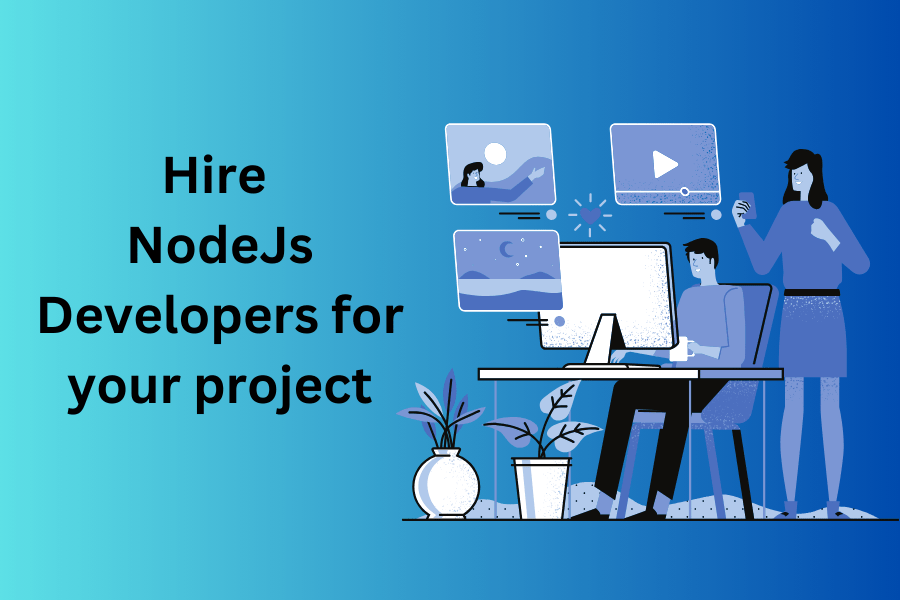In the rapidly evolving world of web development, Node.js has emerged as a powerful and popular technology for building scalable and high-performance applications. Whether you are a startup looking to develop a groundbreaking product or an established company aiming to enhance your online presence, hiring Node.js developers is a crucial step toward achieving your goals. In this comprehensive guide, we will cover everything you need to know about hiring Node.js developers, from understanding their role and skills to the recruitment process and best practices.
Understanding the Role of Node.js Developers
Node.js developers are responsible for creating server-side applications using Node.js, a runtime environment built on the V8 JavaScript engine. They play a pivotal role in designing, developing, and maintaining web applications, APIs, and server-side components. Node.js is particularly known for its non-blocking, event-driven architecture, making it ideal for building real-time applications and high-performance systems.
Key Skills and Qualities to Look for
To hire the right Node.js developers, you should consider the following key skills and qualities:
a. Proficiency in JavaScript: Node.js developers must have a strong command of JavaScript, as it is the primary language for server-side development with Node.js.
b. Node.js Frameworks: Familiarity with popular Node.js frameworks like Express.js and Nest.js is essential.
c. Asynchronous Programming: Node.js is designed for asynchronous programming, so developers should be skilled in handling asynchronous operations using callbacks, promises, and async/await.
d. API Development: Knowledge of REST API development is crucial for building scalable web services.
e. Database Management: Node.js developers should be proficient in working with databases like MongoDB, PostgreSQL, or MySQL.
f. Frontend Integration: Familiarity with frontend technologies like HTML, CSS, and JavaScript frameworks (e.g., React, Angular, or Vue.js) can be a valuable asset.
g. DevOps Skills: Understanding of DevOps practices, containerization (Docker), and deployment tools (e.g., Jenkins, Travis CI) can streamline the development and deployment process.
h. Problem-Solving: Strong analytical and problem-solving skills are essential for debugging and optimizing Node.js applications.
i. Collaboration: Effective communication and teamwork are crucial for collaborating with other developers, designers, and stakeholders.
Recruitment Process
To hire Node.js developers effectively, you should follow a structured recruitment process:
a. Define Requirements: Clearly define the job role, responsibilities, and technical skills required for the position.
b. Job Posting: Create a compelling job posting that highlights the key aspects of the job and your company culture. Post it on relevant job boards, social media, and your website.
c. Resume Screening: Review resumes to shortlist candidates who meet the qualifications.
d. Technical Interviews: Conduct technical interviews to assess candidates’ coding skills, problem-solving abilities, and Node.js expertise.
e. Behavioral Interviews: Evaluate candidates’ soft skills, teamwork, and cultural fit through behavioral interviews.
f. Coding Test/Project: Assign a coding test or a small project to assess candidates’ practical skills and problem-solving capabilities.
g. Reference Checks: Contact references provided by the candidates to validate their work history and performance.
h. Offer and Onboarding: Extend an offer to the selected candidate and facilitate the onboarding process.
Freelancers, Agencies, or In-House Developers
You have several options when it comes to hiring Node.js developers:
a. Freelancers: Freelance Node.js developers can be a cost-effective choice for short-term projects or specific tasks. They offer flexibility but may lack the consistency of in-house developers.
b. Development Agencies: Hiring a Node.js development company provides access to a team of skilled professionals. This option is suitable for projects with varying complexity and scope.
c. In-House Developers: Building an in-house Node.js development team offers complete control and long-term commitment. This approach is ideal for large-scale projects and continuous development needs.
Best Practices for Hiring Node.js Developers
To make the best hiring decisions, consider these best practices:
a. Portfolio Review: Evaluate candidates’ previous work and projects to assess their skills and experience.
b. Test Real-World Scenarios: During technical interviews or coding tests, present candidates with real-world scenarios and challenges they might encounter on the job.
c. Cultural Fit: Ensure candidates align with your company culture, values, and goals to foster a productive work environment.
d. Continuous Learning: Node.js is a rapidly evolving technology, so look for candidates who demonstrate a commitment to continuous learning and staying updated on the latest trends.
e. Competitive Compensation: Offer competitive salaries and benefits to attract and retain top talent.
Conclusion
Hiring Node.js developers is a critical step in building robust and high-performance web applications. By understanding their role, identifying essential skills, following a structured recruitment process, and considering the best hiring practices, you can assemble a talented Node.js development team that will drive your projects to success. Whether you choose freelancers, agencies, or in-house developers, investing in skilled Node.js professionals is a strategic move for your organization’s growth and competitiveness in the digital landscape.




